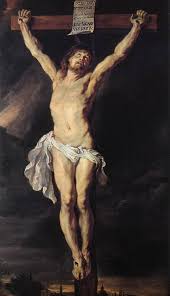There are two options today for saints – the first are the ‘North American Martyrs’, also called the Canadian Martyrs, but who most accurately may be termed the French missionary martyrs to a country that would later be called Canada, in which dominion we celebrate them as a feast in Canada on September 26th, as our secondary patrons, after Saint Joseph.
There is also Saint Paul of the Cross (+1775), founder of an Order devoted to Christ’s Passion, as befits his religious name.
Born in 1694, Paolo Francesco Daneii was the second of sixteen children (!) of a poor family eking out an existence in rural Italy – the opening line to many saints’ lives. So he grew up knowing the value of hard work. With just six of his siblings surviving beyond infancy, Paolo was also vividly aware of the brevity of life, that we must make good use of the time we are given. Hence, his vocation to a contemplative path developed from his earliest years.
The seeds sown in this vocation were nurtured by a priest, who ran a school for children sowed the seeds of a vocation, but one which took its time coming to fruition: Paolo taught catechism for a time, but then went off to fight the Turks, who were threatening Christendom once again. He soon realized that his soul was not made for soldiering. After helping an elderly childless couple, they wanted to make him their heir, an offer which he politely declined; his uncle, a priest, also urged him to marry and settle down, but Paul knew he was called to a higher and narrower path. As he would put it: The Cross is the way to Paradise, but only when it is borne willingly.
Hence, following an interior revelation in prayer, Paul, with his own brother, John Baptist, began a new Order, devoted to contemplating and preaching the Suffering and Cross of Christ, the ‘Passionists’, whose austere existence – including at least three hours of mental prayer a day – did not at first attract large numbers. They began in Rome, their monastery being called a ‘Retreat’ to emphasize the solitary, prayerful aspect of their rule, and grew slowly, as Father Paul desired, and as he knew it would. Such gradual growth, like the seed sown in a field, came with its own setbacks and disappointments. But trusting in God, against earthly expectations, he stayed the course – Saint Thomas says that long-suffering, patience in the midst of unending trial, is one of the most difficult of virtues, a timely applicable message. Father Paul of the Cross was one of the most popular preachers of his day, for his words derived from his deep prayer life, his love of God, his own sufferings, and his own example. He, like his Master, spoke with authority.
His was not a gloomy message – for the Passion of Christ is the sign of the infinite love of God our Creator, Redeemer, Who gives us joy and hope:
Listen to the sermon preached to you by the flowers, the trees, the shrubs, the sky, and the whole world. Notice how they preach to you a sermon full of love, of praise of God, and how they invite you to glorify the sublimity of that sovereign Artist who has given them being.
After bearing much fruit, and untold conversions, Paul went to his eternal reward on October 18th in 1775 in Rome at the ‘Retreat’ of Saints John and Paul, just as the winds of atheistic revolution were to sweep across France, Italy and Europe. At the time of his death, there were 180 Fathers and Brothers living in twelve Retreats across Italy, mostly in what were then the Papal States. The Passionists now have members throughout the world, who will hopefully preach the Passion and Death of Christ until He comes again: In the midst of the apparent chaos and flux of this passing age, there is an anchor and sure hope: Crux stat, dum volvitur orbis. The Cross stands, while the world turns.
We adore Thee, O Christ, and we bless Thee, for by Thy holy Cross, Thou has redeemed the world.
Saint Paul of the Cross, ora pro nobis!











